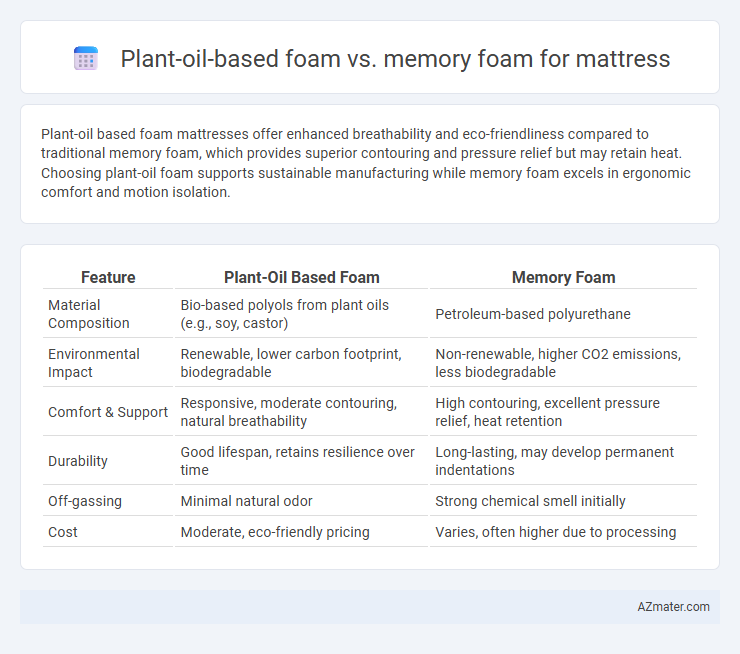Plant-oil based foam mattresses offer enhanced breathability and eco-friendliness compared to traditional memory foam, which provides superior contouring and pressure relief but may retain heat. Choosing plant-oil foam supports sustainable manufacturing while memory foam excels in ergonomic comfort and motion isolation.
Table of Comparison
| Feature | Plant-Oil Based Foam | Memory Foam |
|---|---|---|
| Material Composition | Bio-based polyols from plant oils (e.g., soy, castor) | Petroleum-based polyurethane |
| Environmental Impact | Renewable, lower carbon footprint, biodegradable | Non-renewable, higher CO2 emissions, less biodegradable |
| Comfort & Support | Responsive, moderate contouring, natural breathability | High contouring, excellent pressure relief, heat retention |
| Durability | Good lifespan, retains resilience over time | Long-lasting, may develop permanent indentations |
| Off-gassing | Minimal natural odor | Strong chemical smell initially |
| Cost | Moderate, eco-friendly pricing | Varies, often higher due to processing |
Introduction: Exploring Mattress Material Innovations
Plant-oil based foam offers a sustainable alternative to traditional memory foam by incorporating renewable resources like soy or castor oil, reducing environmental impact without compromising comfort. This eco-friendly foam provides excellent pressure relief and breathability, enhancing sleep quality while minimizing off-gassing of harmful chemicals common in petroleum-based memory foam. Advances in bio-based foam technology prioritize durability and support, positioning plant-oil foam as a competitive, green innovation within the mattress industry.
What is Plant-Oil Based Foam?
Plant-oil based foam is a sustainable alternative to traditional memory foam, made by incorporating natural oils like soy or castor into the polyurethane foam manufacturing process. This bio-based material reduces reliance on petrochemicals, enhancing breathability and eco-friendliness while maintaining the comfort and support characteristics essential for mattresses. Compared to conventional memory foam, plant-oil based foam typically offers improved airflow and a more environmentally responsible production footprint.
What is Memory Foam?
Memory foam is a viscoelastic material made from polyurethane combined with additional chemicals to increase its density and viscosity, offering superior pressure relief and body contouring properties. It responds to body heat by softening and molding to the sleeper's shape, enhancing comfort and support by distributing weight evenly. High-quality memory foam mattresses also feature excellent motion isolation, making them ideal for couples.
Environmental Impact: Plant-Oil vs Memory Foam
Plant-oil based foam mattresses use renewable, biodegradable materials derived from natural sources, significantly reducing their carbon footprint and dependence on petroleum. Memory foam, primarily made from petroleum-based polyurethane, contributes to higher greenhouse gas emissions and slower degradation in landfills. Choosing plant-oil foam supports sustainable manufacturing practices and lowers environmental impact compared to traditional memory foam options.
Comfort and Support Comparison
Plant-oil based foam mattresses offer enhanced breathability and natural elasticity, providing consistent support and a cooler sleeping experience compared to memory foam. Memory foam contours closely to body shape, delivering superior pressure relief but can retain heat, affecting comfort for some sleepers. The plant-oil foam's responsiveness and eco-friendly composition often result in a balanced blend of comfort and support, appealing to environmentally conscious consumers seeking durability and temperature regulation.
Breathability and Temperature Regulation
Plant-oil based foam offers superior breathability due to its open-cell structure, promoting enhanced airflow and preventing heat retention. Memory foam, while conforming closely to the body, tends to trap heat and reduce ventilation, often causing discomfort for hot sleepers. The inherent natural oils in plant-oil foams further aid in moisture-wicking and maintaining a cooler sleeping surface throughout the night.
Durability and Longevity of Both Foams
Plant-oil based foam mattresses typically exhibit enhanced durability due to their environmentally friendly, bio-based composition, which provides good resistance to wear and tear over time. Memory foam, known for its dense structure, offers excellent longevity by maintaining shape retention and support even after extended use. Both foams compare favorably in terms of resilience, but memory foam generally shows superior lifespan under consistent pressure and weight distribution.
Allergies and Chemical Sensitivities
Plant-oil based foam mattresses significantly reduce exposure to harsh chemicals and volatile organic compounds (VOCs), making them a superior choice for allergy sufferers and individuals with chemical sensitivities. Memory foam often contains synthetic chemicals and off-gases that can trigger respiratory issues, skin irritation, and allergic reactions. Choosing plant-oil based foam enhances indoor air quality and minimizes the risk of adverse health effects linked to conventional foams.
Price and Value Analysis
Plant-oil based foam mattresses typically offer a more eco-friendly option with competitive pricing ranging from $500 to $1,200, providing good value for consumers seeking sustainable materials. Memory foam mattresses often cost between $700 and $2,000, with higher prices justified by superior pressure relief and durability. The price-value analysis favors plant-oil foam for budget-conscious buyers prioritizing environmental impact, while memory foam suits those willing to invest more for enhanced comfort and longevity.
Which Mattress Foam is Best for You?
Plant-oil based foam mattresses offer enhanced breathability and eco-friendliness, making them ideal for sleepers seeking a sustainable and cooler rest experience. Memory foam mattresses excel in pressure relief and contouring support, preferred by individuals with joint pain or needing advanced body conformity. Choosing the best mattress foam depends on personal priorities such as temperature regulation, environmental impact, and specific comfort requirements.

Infographic: Plant-oil based foam vs Memory foam for Mattress
 azmater.com
azmater.com